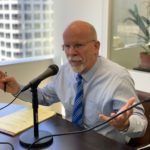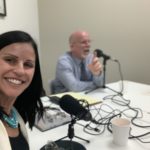San Diego Lawyer Artists!
In the February/March 2020 edition of SDCBA’s San Diego Lawyer, Renee Stackhouse and I have an article on San Diego Lawyer Artists. Check it out at page 32 – https://bit.ly/3cEGeo7
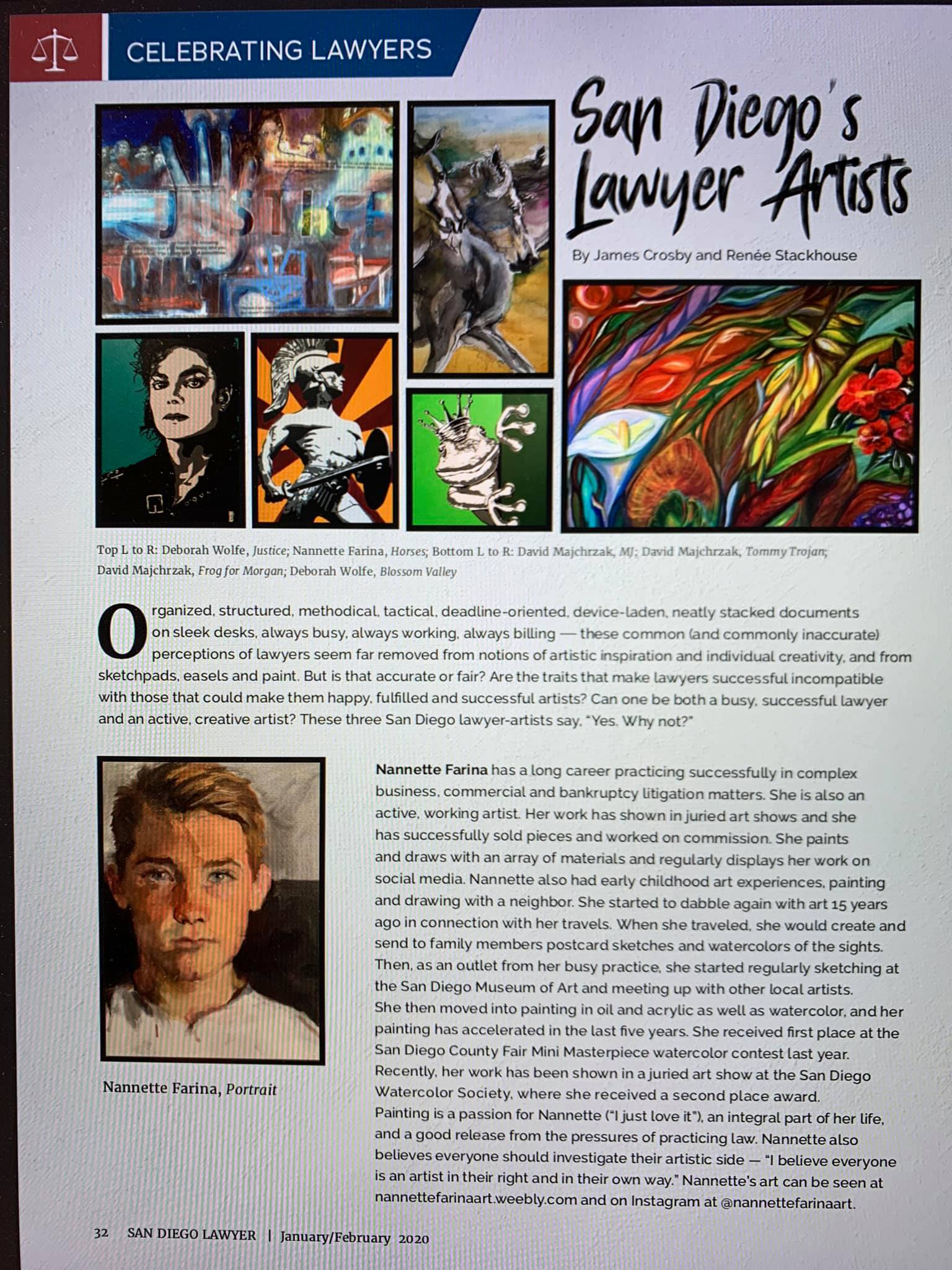
Time to Meet & Confer – Episode 6 – There’s More to These Lawyers Than Meets the Eye (and Ear) – Lawyers Artists – Live Now!
Organized, structured, methodical, tactical, deadline-oriented, device-laden, neatly-stacked documents on sleek desks, always busy, always working, always billing — these common (and commonly inaccurate) perceptions of lawyers seem far removed from notions of artistic inspiration and individual creativity, and from sketchpads, easels, and paint. But, is that accurate or fair? Are the traits that make lawyers successful incompatible with those that could make them happy, fulfilled, and successful artists? Can one be both a busy, successful lawyer and an active, creative artist?
Episode #6 of the San Diego County Bar Association’s “Meet and Confer” podcast answers this question and is live at https://www.sdcba.org/index.cfm?pg=Tech-Center and on Apple iTunes and Google Podcasts.
In this episode of SDCBA’s Meet and Confer podcast, Renee Stackhouse and I chat with San Diego attorneys Philip Mauriello and Nannette Farina about their art and music, and its significance in their professional and personal lives.
San Diego Attorney Nannette Farina has a successful San Diego complex business, commercial and bankruptcy litigation practice. She is also an active working artist. Her work has shown in juried art shows and she has successfully sold pieces and worked on commission. San Diego Attorney Philip Mauriello just launched his San Diego business law practice. His is also a musician, playing guitar and mandolin. Phillip regularly performs and has played in cover bands, including a country cover band in New Jersey!
Can one be both a busy, successful lawyer and an active, creative artist? As David and Nannette attest in this interesting podcast, “Yes, Why Not?” Take a few minutes, give it listen, and get inspired!
And take at look at Renee’s and my companion piece on “Lawyer Artists” in the Jan/Feb 2020 Edition of SDCBA’s San Diego Lawyer.
“Meet & Confer” is a podcast for and about our unique San Diego legal community. We hope to grow our San Diego audience as we grow the podcast. Please look for new episodes, keep listening, and let us know what you’d like to hear about on future episodes by sending an email to [email protected].
Losing your First Trial, Ouch! Good Bosses to the Rescue!
I was lucky to be able to try my first case very early in my career – in my 3rd year of practice, now almost 35 years ago! It was a business case, breach of contract, I think, a bench trial in North County Superior Court. Up against two older experienced attorneys.
I had worked hard, was ready to go, fully prepped, couldn’t lose! When I Ieft the office early that morning to go to court, two of my bosses, Dick Lynn and Jim Mehalick, both fine litigators, were in the small reception area of our small firm to see me off. Dick, with a big smile on his face, said – I will never forget this – “if you lose, don’t come back!” Jim smiled. Funny, I thought, kinda? They wished me good luck. Off I went.
I represented the plaintiff. Trial started, I gave opening, put up my witnesses, got my evidence in, closed my case, and LOST! Motions for judgment granted to both defendants.
Devastated. Obviously picked the wrong career. What will the client do – sue me? What will my bosses do? Maybe they weren’t kidding, will they let me back in? Jill and I have a baby on the way, just bought a house, how will I pay the bills? Back to marine biology? A young lawyer unrealistically projecting out years about how a career crunching loss would ruin his entire career and life! In retrospect, silly, but, hey, I LOST my first trial, a case I knew I couldn’t lose.
I went to work the next day to face my bosses. Needless to say, they let me back in the office! We went over the trial, the result, and our remedies. They were encouraging, supportive, thoughtful. They explained, as any trial lawyer would, you can’t win them all, you will lose cases you thought you would win and win some sure losers. Great support, perfect advice – just what I needed, righted my ship, reestablished my gravity. Taught me some lessons. Put me back to work. Ending of the story – we appealed, won, and settled the case.
Moral of the story – its good to have supportive bosses/colleagues/mentors and perseverance pays!
Time to Meet & Confer – Episode 5 – Attorney David Leatherberry and SDCBA Tech Officer Adriana Linares on Launching a Solo Practice & the Tech to Make it Happen – Live!
Going solo can be both stressful and exciting – leaving the comforts of a fully supported big law firm can be hard. But the allure of having the freedom to practice law and serve clients the way you want is also hard to resist.
Episode #5 of the San Diego County Bar Association’s “Meet and Confer” podcast takes on this topic and is live at https://www.sdcba.org/index.cfm?pg=Tech-Center and on Apple iTunes and Google Podcasts.
In this episode of the SDCBA’s Meet and Confer podcast, Renee Stackhouse and I chat with SDCBA Member, David Leatherberry, about his gutsy move to leave Big Law and launch a successful and fulfilling solo practice and with SDCBA Tech Officer Adriana Linares about the tech to make it happen.
This was another fun podcast and a lively, loose conversation about going solo and the tech that allow solos to compete and succeed in a competitive legal market. This conversation will be of keen interest to all those solos and small firmers out there – and there’s lots of them in San Diego, including me and Renee – and to those thinking about striking out on their own. Give it a listen and tell your friends to do the same!
“Meet & Confer” is a podcast for and about our unique San Diego legal community. We hope to grow our San Diego audience as we grow the podcast. Please look for new episodes, keep listening, and let us know what you’d like to hear about on future episodes by sending an email to [email protected].
Mentors.

It’s interesting the specific memories that stick in your head and come back unexpectedly. Sitting in my office, on a Saturday, deadly-quiet, catching up from a busy week and getting ready for the next one, wishing I was outside. A very specific conversation from 35 years ago pops into my head. I was young lawyer, working hard, but still struggling to keep up with a heavy workload. Dick Lynn, a fine San Diego trial lawyer, then my boss, later my partner, and a real mentor to me (not sure he knows that, but true) saw I was struggling, and comes into my office. He didn’t give me some long speech, or criticize my efforts, or tell me I needed to work harder, or that I needed to be more efficient, …. He just said, “sometimes you just need to work a Saturday to keep up”. Good, simple, advice. That very small event and simple advice are stuck in my head, as clear as day, from 35 years ago. Amazing

Tips for Financial Success in a Solo or Small Firm Practice
We lawyers are privileged to do interesting, significant, challenging work for the benefit of others. But we also need to make money to pay our bills, support our families, and do the things we want to do – money to sustain our personal lives. So, we must figure out how to turn this interesting work we are privileged to do into a sustained flow of money that allows us to continue to do this interesting work we are privileged to do. Despite the public perception of lawyers rolling in dough, turning the practice of law into a profitable business, at least for a lot of lawyers, and especially young attorneys striking out on their own, is not always that easy. Last year, I published an article here providing “Tips for Solo Success”. With this article, I narrow my focus to provide tips for financial success as a solo or small firmer.
To sustain any degree of long-term financial success, lawyers must run their legal practices like businesses. Fee arrangements with clients must be business transactions with well-understood risks and benefits, and off-ramps for both sides if terms are not met. Lawyers do provide services guided by professional and ethical responsibilities. Requiring clients to meet their fee obligations, running efficient practices, and turning good profits are not inherently at odds with those professional and ethical responsibilities. One can always choose to stay in a case too long for a non-paying client, or cut one’s fees to get a case, or make any number of bad business decisions in furtherance of case, cause, or client. Sometimes, you just can’t walk away from the case, or the new client who can’t pay full freight really needs help and you can’t say no, or you just hang in with a slow-pay client because you like the client and believe he/she will get you current in six months. We are all people driven by emotions, perceptions, and impulses, good and bad, and not always by the calculated need to make money. But one needs to make those types of decision fully understanding the likely ramifications and not with pie in the sky hope it will all work out. Run your practice like a business based on thoughtful, deliberate, decision-making. That is the key to long-term success. Here are some tips to help you do just that and to help you find financial success in your practice:
1. Set Market Rates and Hold to Them.
This is, at times, a hard lesson to learn. Discounting your rates or fees to get new clients is bad business. It is a race to the bottom. There is always an attorney around the corner who will work cheaper than you. Your attorney time is valuable. It has a market value. Investigate the market, determine what your rate/fee should be, and then stick to it. Discounting your rates/fees undermines your value to your practice, and the perception of your value to your client. If you want to give some money back to a good client, give a courtesy discount for work done.
2. Get Fee Agreements.
Needless to say, you are required to do so in most instances under State Bar Rules. So, there’s that. But fee agreements are also just good business. They provide, in black and white, the obligations and expectations of both attorney and client. They set forth in detail how the attorney will be paid, how her fee will be calculated, and the ramifications of non-payment. It provides exit points for attorney and client under articulated circumstances. It is the source and basis for any successful enforcement effort in the event the client breaches. Further, negotiation and execution of the fee agreement requires both attorney and client to reflect on the seriousness of, and significant obligations arising from, the to-be-undertaken work. It’s easy to say I want to sue so-and-so for this-and-that! It requires more thoughtful reflection when to actually sue so-and-so for this-and-that one has to sign a fee contract with significant financial commitments and pay a retainer. And that is as it should be!
3. Require Replenishing Retainers
Require a retainer in every case and the replenishment of that retainer if it falls below a pre-determined level. If a prospective client cannot, or will not, provide a retainer, then that client is likely not serious about sustaining, has no idea what it costs to sustain, or will not be able to sustain, the financial burden of the matter going forward. Set a fair minimum retainer on all your cases. Modify upwards dependent on the nature and scope of the case. Tell prospective clients you have a minimum retainer on all cases and let them move on if they cannot meet that retainer. Don’t negotiate below your minimum retainer or, if you do, do so with the clear understanding that it is not a wise business practice. The replenishment requirement, if enforced, allows the attorney to remain current and above water in a matter on an ongoing basis. If the client does not meet the replenishment requirement, one can withdraw without getting significantly underwater on the fee. Plus, assessing and setting a fair retainer in a case requires the attorney to seriously consider and assess the nature, scope, cost, and financial risk of the prospective matter. A “sign them up, worry about the fee later” approach to client generation is not good business.
[3.5. For Litigators Only – Get Trial Deposits!]
If you’re not a litigator, you can move to #4. For litigators, seriously consider including a provision in your fee agreement that allows you to increase the retainer size as you move towards trial or other significant case event. Litigators are most at risk, financially, as cases ramp up for trial. The work, the fees, the costs increase, often times explode, outpacing retainer levels set early in the case. Then, post-trial, one finds oneself in deep to a client, with a concluded matter, and a client wanting to negotiate the fee. It’s even worse when you didn’t get the desired result at trial. Include a provision that allows you, within a set time before a trial or other significant marker, to require a deposit of fees that fairly covers the cost of that event. Not only does such a provision give the attorney some degree of protection from the risks of a trial, it also requires the attorney and client to seriously focus on and assess what the case will cost to go to trial and whether settlement is a viable alternative. Heading to trial with a case on financial cruise control is bad business.
4. Record Time Concurrently.
Easy to say, hard to do. I hate recording time. Every attorney hates recording time. For those of us who principally work on an hourly basis, it is, without exception, the worst part of practicing law. But, in the context of running our businesses, it is the most important thing we do. That recorded time is the life blood for our practices. And our clients are entitled to fair billing, accurately reflecting what we did for them and what we are billing them for. The only fair and accurate way to record our time is to do it as we do the work. The major billing programs all have running clock features to record time as you work and mobile time-keeping functions for work on the go. They work great. It just takes discipline, excruciating discipline, to use them. In this age of email, we all have email roadmaps to create time entries for past work done. And, if we are honest, we will all admit to having done so, perhaps quite often. But, we really shouldn’t. It’s not fair to the client, it serves to delay prompt end-of-the-month billings and, for the attorney, invariably results in the underreporting of billable time. Further, it takes much more time to recreate billed time than it does to record the time while you work. So, if you don’t record while you work, you will ultimately end up spending more time, creating less accurate billings, which underreport your actual billable time – spending more time to produce less accurate billings which make you less money! Dumb, huh? Currently, I use the Time Capture function in TimeSlips – works perfectly when I am disciplined enough to use it, which is most, but surely not, always. But I try!
5. Capture All Billable Expenses
Your fee agreement will detail what expenses are to be charged to the client and how they are to be charged. Promptly charge the client for and collect those expenses. Expenses are incurred and documented in many ways in this digital age. Many services, like filing fees and online research fees, are drawn directly from bank accounts with emailed receipts. These can get lost in the daily deluge of email, then not billed and recovered. A few unbilled filing fees or service charges a month can add up to a sizable chunk at year’s end. And, that’s money right out of your pocket. In my office, both my paralegal and I double check our draft bills at month-end against withdrawals reflected in my online operating account statement. We, invariably, catch charges, usually small ones, that otherwise may not have been billed. Try that approach – works for us.
6. Bill Fairly and Promptly
Bill promptly at the end of your billing period. Cash flow is critical in a solo or small firm practice. Billing delays interrupt regular cash flow. Don’t sit on cashflow in the form of un-billed, un-invoiced time. You don’t bill promptly, you don’t get paid promptly, you can’t pay your bills or bring money home promptly. It’s pretty simple. Plus, prompt, regular billing creates a positive client perception of office efficiency. And, the more you delay your billing in a case, the more work you put into the case without corresponding case cash flow, placing yourself at greater financial risk in the case. And, bill fairly. Work and bill the case as and when required, and not as the billing calendar dictates. Do not cram in a bunch of work on a case into the last couple of days of the billing period just so you can squeeze it into this billing period as opposed to the next. Clients will see that and properly question it.
7. Religiously Monitor Your Finances & Pinch Every Penny.
Again, cashflow is king. Regularly monitor your collections, your billings, and your expenses to maintain cash flow. If a client is not paying when she should, call her. On the expense side, buy what you need. Beyond that, pinch every penny. It’s not the big, fully vetted expenditures that hurt. You have done the cost-benefit analysis on those. It’s always the accumulated small expenditures that hurt. Get what you need – after that, pinch every penny!
8. Enforce Fee Agreements.
Enforce your fee agreements. If the client is not paying in accordance with the fee agreement, get out and move on to the next client. If the client will not replenish a retainer per the agreement, get out and move on to the next client. You are running a business. You need cash flow to meet your business obligations and take money home. Make sure the clients meet their contractual fee obligations. If they don’t, get out. You’re their lawyer, not their legal line of credit.
9. Make Your Quarterly Tax Deposits.
Make your quarterly tax deposits. Religiously set aside the money you need to pay your taxes. Once you start slipping back on your tax set-asides/deposits, you will soon find yourself getting extensions on your returns to make the money to pay last year’s taxes. Been there, done that! It gets brutal and it’s a difficult cycle to get out of.
10. Pursue Arbitration to Get Paid.
This will be controversial, but, I generally will not let a former client, who can pay, walk away from a bill for my services. It’s just not fair. I will let a client pay off a bill over time, even a long time, and will cut deals to get immediate payment. But, unless it is a fairly small amount or I am satisfied after investigation the client no longer has the ability to pay, I will enforce my agreement and pursue that unpaid bill through arbitration or otherwise. I have rarely been in that position and it has usually been because I did not follow my own advice noted above. And the accepted rationale for not doing so – the invitation of a cross-complaint for malpractice – is surely valid. But I will just not walk away from getting paid for my work. And in those rare instances where I have pursued enforcement of fee agreement, I have gotten paid and there was no malpractice claim. If I follow my own advice noted above, I should not find myself in that position again. And the vast majority of clients, including mine, are good people who understand their obligation to pay for their legal services, and make every effort to do so. So, hopefully, I never have to follow my own advice on this one again!
As a final and rather obvious piece advice, do excellent work and provide good service. Happy clients are paying clients!
With some minor differences, this article originally appeared in the September/October July/August 2019 issue of San Diego Lawyer magazine. It is reprinted with the permission of the San Diego County Bar Association.
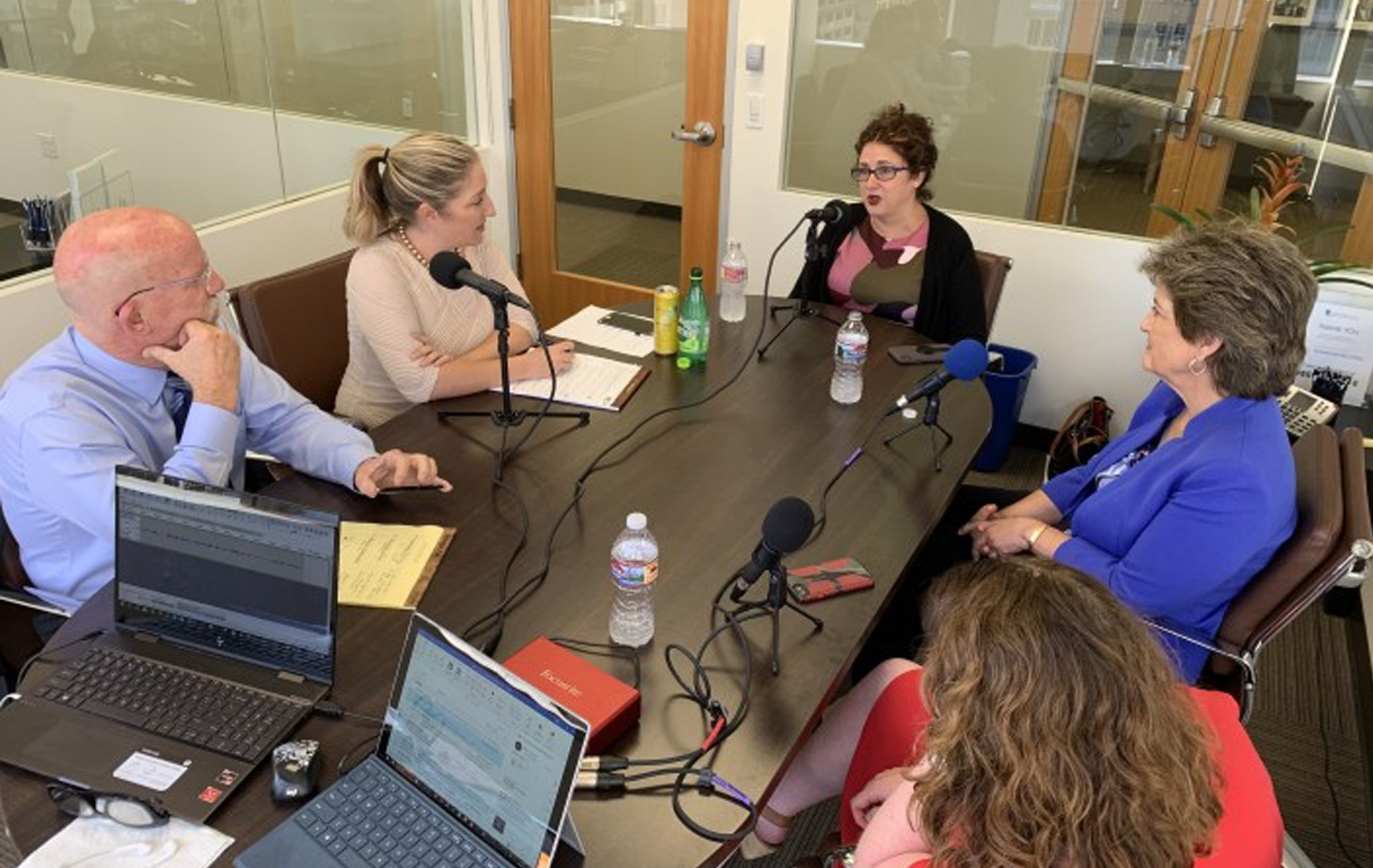
Time to Meet & Confer! Women Leading in San Diego Law – Episode #4 of SDCBA’s Meet and Confer Podcast is Live.
Episode #4 of the San Diego County Bar Association’s “Meet and Confer” podcast is live here and on Apple iTunes and Google Podcasts.
In this episode, Renee Stackhouse and I welcomed leading San Diego attorneys Heather Rosing, Patricia Hollenbeck and Heather Riley for a planned discussion on Big Law – San Diego Style!
But, what started out as a discussion of life in large San Diego law firms quickly morphed into a fascinating and free-wheeling discussion about female leadership in San Diego firms, client generation, career paths, partnership tracks, office life, mentoring young attorneys, balancing family and career, and so much more. Heather, Patty and Heather tackle some weighty topics, tell some great stories, and offer some very wise advice! It was a lively and enlightening discussion with some of San Diego’s best about practicing law in our fine city. To have these three very busy, very talented, very engaging San Diego lawyers, and friends, in a room together for an extended chat on law, life, career, and family was really something special! And lots of fun! This discussion will be of keen interest to all San Diego attorneys, and it’s surely a must-listen for young lawyers working to establish and build successful San Diego legal careers. Give it a listen and tell your friends to do the same!
“Meet & Confer” is a podcast for and about our unique San Diego legal community. We hope to grow our San Diego audience as we grow the podcast. Please look for new episodes, keep listening, and let us know what you’d like to hear about on future episodes by sending an email to [email protected].
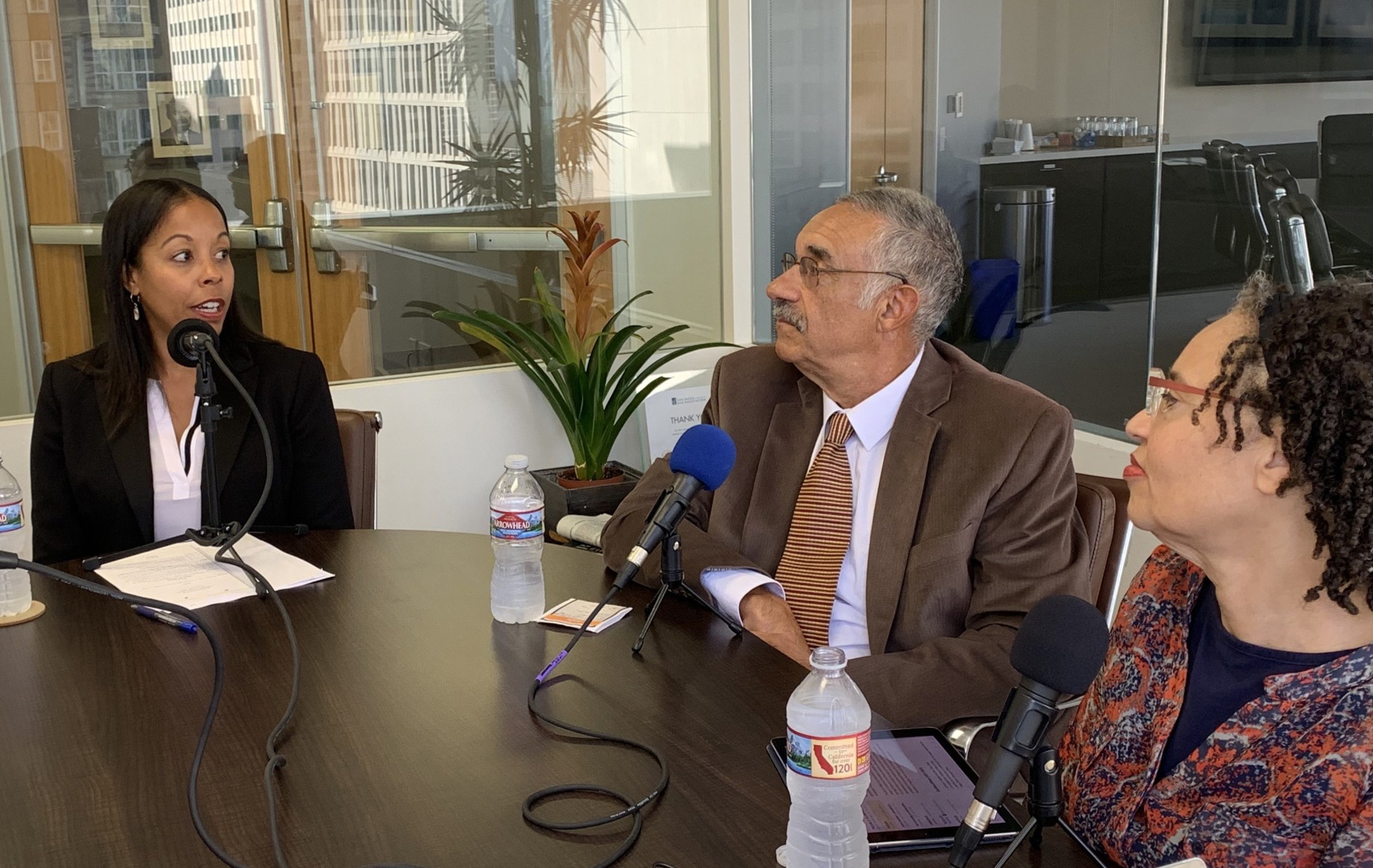
The Legacy of Judge Earl B. Gilliam and the Important Work of the Earl B Gilliam Bar Association and Foundation – Episode #3 of SDCBA’s Meet and Confer Podcast is Live.
The third episode of SDCBA’s “Meet & Confer” podcast hosted by SDCBA Members, Renee Stackhouse and Jim Crosby, is out and available for listening and download at here. (It’s also an Apple and Android Podcast – “SDCBA’s Meet and Confer”).
In this episode of SDCBA’s Meet and Confer, Jim and Renee sit down with presidents, past and present, of the Earl B. Gilliam Bar Association and its sister Foundation to discuss the legacy of Judge Earl B. Gilliam and the significant past and ongoing work, and activism, of the EBGBA and its foundation.
Dennis Dawson is a founder and four-time past-president of the Association. After years serving as California Deputy Attorney General, Mr. Dawson now practices employment discrimination and business litigation as a solo practitioner.
Andrea St. Julian is the president of the Association and practices criminal and civil appellate law.
Yahairah Aristy is the president of the Foundation and a Deputy Public Defender for the County of San Diego handling felony cases.
In a fascinating and topical discussion, Dawson, St. Julian and Aristry passionately described Judge Gilliam’s significant legal accomplishments, his profound effect on the San Diego legal community, his battles for social justice, and his enduring legacy. Dennis Dawson provided a personal perspective on the positive effect Judge Gilliam had on his life and legal career and, more broadly, on the lives of many African-American San Diego lawyers. The discussion then turned to the current activities of the EBGBA and its sister foundation, and the ongoing efforts of the Association to promote equal access to justice and social justice through endorsements and other community programs and projects. It was an engaging, and inspiring, discussion.
We hope you will take some time out of, or perhaps as part of, your busy lives to listen to this interesting and important discussion. Renee and I enjoyed, learned a great deal from, and were inspired by our panelists and their insights on Judge Gilliam and the ongoing, important, work of the Earl B. Gilliam Bar Association and Foundation.
“Meet & Confer” is a podcast for and about our unique San Diego legal community. We hope to grow our San Diego audience as we grow the podcast. Please look for new episodes, keep listening, subscribe to the Apple podcast, and let us know what you’d like to hear about on future episodes by sending an email to [email protected].
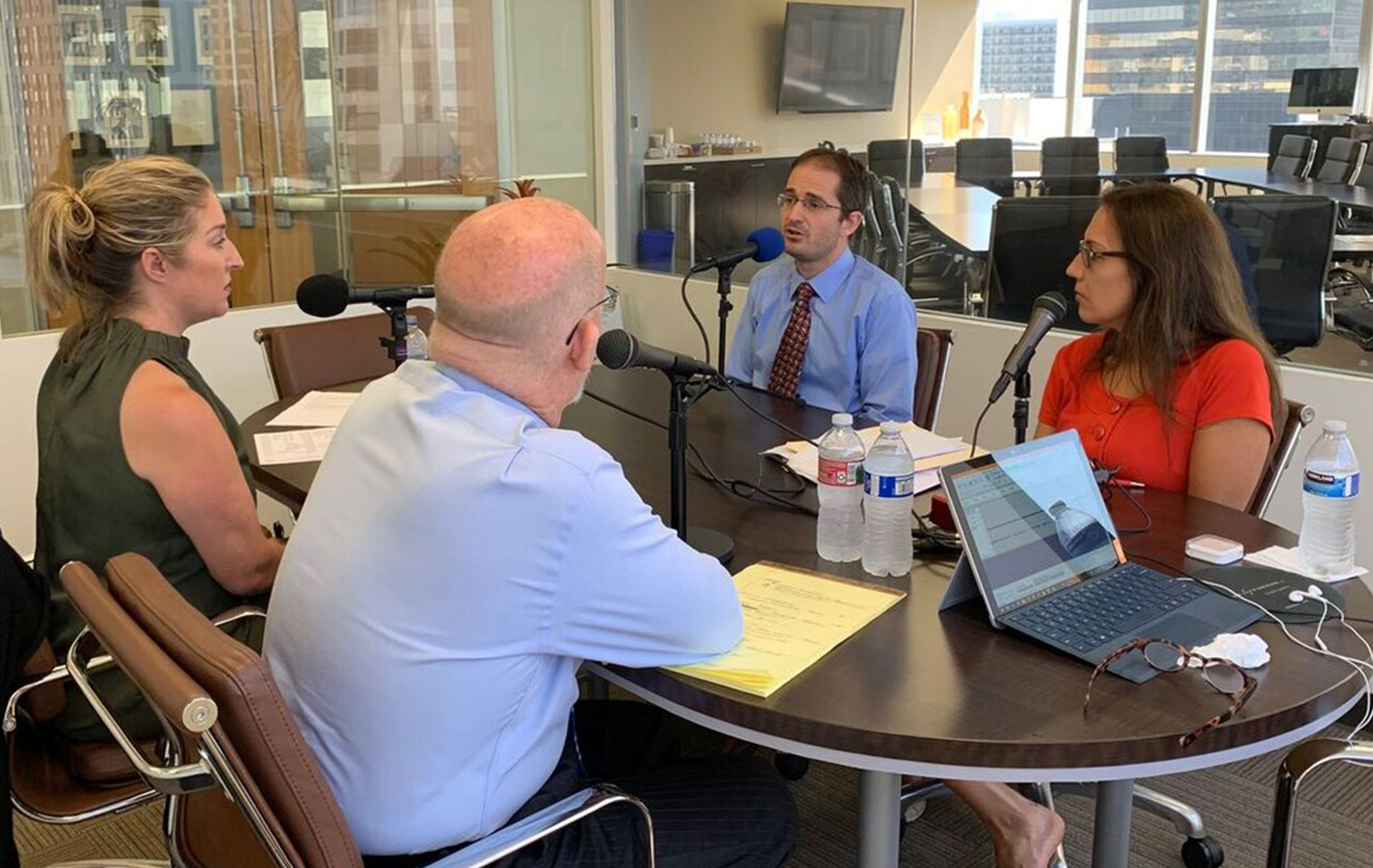
It’s a Heckuva Time to Be an Immigration Attorney in Our Border City! – Episode 2 of SDCBA’s “Meet & Confer” podcast is out!
The second episode of SDCBA’s “Meet & Confer” podcast hosted by SDCBA Members, Renee Stackhouse and Jim Crosby, is out and available for listening and download here. (It’s also an Apple and Android Podcast – “SDCBA’s Meet and Confer”).
In this episode of Meet and Confer, Renee and Jim sit down with San Diego immigration attorneys Teodora Purcell and Jesse Imbriano to discuss the challenges for attorneys practicing immigration law in these turbulent times in our border city. It was, to say the least, a fascinating and inspiring discussion!
Teodora D. Purcell practices in the area of immigration law. She has extensive experience in all facets of U.S. immigration law with focus on business immigration. Ms. Purcell advises corporate and individual clients on a variety of employment and family-based nonimmigrant and immigrant petitions, I-9 compliance, applications for U.S. citizenship and other immigration benefits. She is certified in Immigration and Nationality Law by the California State Bar, Board of Legal Specialization. Ms. Purcell is a 2001 graduate of the University of San Diego School of Law and Special Counsel at Duane Morris, LLP.
Jesse Imbriano is the supervising attorney at Casa Cornelia Law Center, a pro bono law firm in San Diego. Casa Cornelia Law Center provides direct representation in humanitarian immigration applications, including asylum and related relief and protection, special immigrant juvenile status, U and T visas, and VAWA self-petitions and cancellation of removal. Mr. Imbriano directly supervises the legal work of the law firm—including a robust team of staff attorneys and hundreds of volunteer attorneys from the private bar—while maintaining an active case load. Mr. Imbriano is a graduate of the Villanova University School of Law.
“Meet & Confer” is a podcast for and about our unique San Diego legal community. We hope to grow our San Diego audience as we grow the podcast. Please look for new episodes, keep listening, subscribe to the Apple podcast, and let us know what you’d like to hear about on future episodes by sending an email to [email protected].
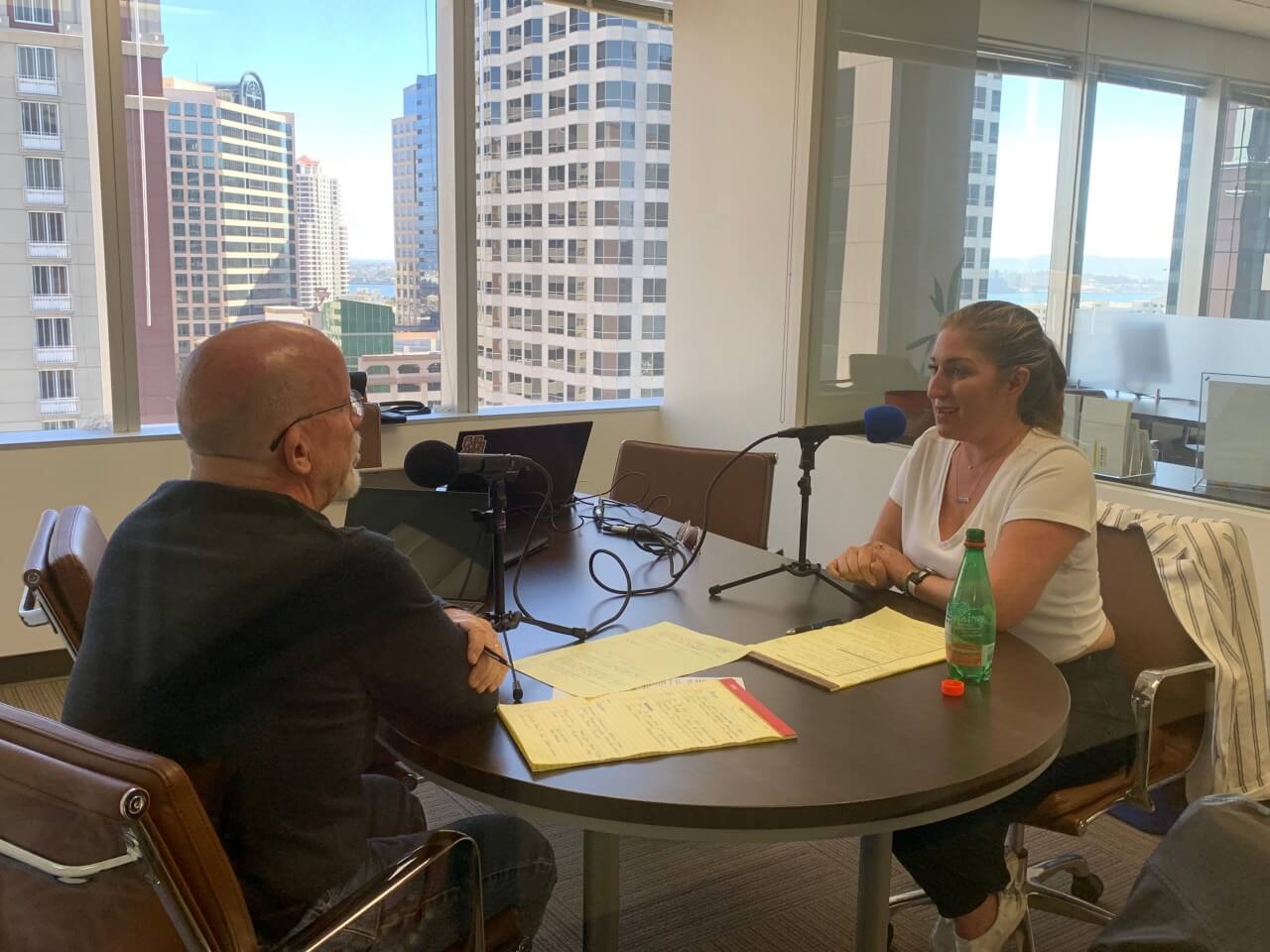
Meet & Confer – First Episode Available Now!
The first episode of SDCBA’s “Meet & Confer” podcast hosted by SDCBA Members, Renee Stackhouse, and Jim Crosby, is out and available at https://bit.ly/334krSm. “Meet & Confer” is a podcast for and about our unique San Diego legal community and we are quite proud of this inaugural episode. We had lots of fun recording it and hope you will enjoy it. Let us know what you’d like to hear about future episodes by sending an email to [email protected].


